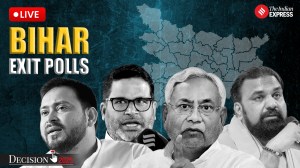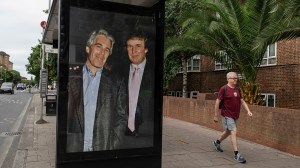Iraqi PM calls for unity dialogue
Iraq’s interim Prime Minister vowed on Monday to unite the country’s competing ethnic and religious groups, trying to build broad ...

Iraq’s interim Prime Minister vowed on Monday to unite the country’s competing ethnic and religious groups, trying to build broad support a day after millions of voters cast ballots in a historic election.
Attempting to seize momentum from Sunday’s unexpectedly successful poll, Iyad Allawi said in a televised address: ‘‘Starting from today, I will begin a new national dialogue to ensure all Iraqis have a voice in the new government.’’
Electoral officials estimate around eight million Iraqis turned out to vote, confounding predictions many would be scared away by insurgent threats of a bloodbath.
But although the election day onslaught of suicide bombers and mortars was less bloody than expected, experts warned the insurgency was far from over and militants would strike back.
‘‘The whole world is watching us. As we worked together yesterday to finish dictatorship, let us work together towards a bright future —— Sunnis and Shias, Muslims and Christians, Arabs, Kurds and Turkmen,’’ Allawi declared, speaking at a conference centre once used by Saddam Hussein and his officials.
Although Iraqis queued up enthusiastically to cast their ballots in many places, numbers appeared to be low in Sunni Arab areas where the insurgency is strongest —— highlighting the dangerous communal rifts facing a new government.
‘‘It is time to put the divisions of the past behind us and work together to show the world the power and potential of this great country,’’ said Allawi, a secular Shia who has a chance of being renamed Prime Minister in the next government.
Shias, who make up about 60 per cent of Iraq’s population,are widely expected to have won most votes in the election, and officials in the top Shia-led coalition, the United Iraqi Alliance, have already claimed a degree of victory. Shia leaders were quick to issue assurances they plan to bring the Sunni minority, dominant under Saddam, into the political process.
‘‘We are looking at ways of including Sunnis,’’ said Ibrahim Bahr al-Uloum, a candidate on the United Iraqi Alliance list. ‘‘I doubt very much Iraq will witness a civil war in the short or long run. We reassure our brothers that any step Iraq takes must include all parts of Iraq…No one can be left out.’’
Across much of Iraq there was a sense of accomplishment after the vote, with many people displaying index fingers stained with purple polling ink, proud to have braved insurgent threats against the first multi-party poll in 50 years.
Militants tried to make good on their threat to drench the poll in blood, killing 35 people in suicide bomb and mortar attacks, but the death toll was far below what some had feared. Interior Minister Falah al-Naqib attributed the relative calm to a three-day security blitz, in which he said more than 200 suspected insurgents had been detained.
Meanwhile a report said the US occupation authority in Iraq was unable to keep track of nearly $9 bn it transferred to government ministries, which lacked financial controls, security, communications and adequate staff, an inspector general has found. US officials relied on Iraqi audit agencies to account for the funds but those offices were not even functioning when the funds were transferred between October 2003 and June 2004, said an audit by a special US inspector general. —Reuters



- 01
- 02
- 03
- 04
- 05




























